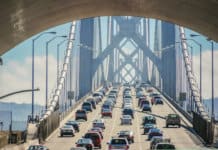As expected, the U.S. Environmental Protection Agency (EPA) has officially announced it is withdrawing California’s waiver under the Clean Air Act (CAA) to set its own vehicle emission standards.
On Thursday, the EPA and the U.S. Department of Transportation’s National Highway Traffic Safety Administration (NHTSA) took what they call an initial step toward finalizing the proposed Safer, Affordable, Fuel-Efficient (SAFE) Vehicles Rule by issuing a final action entitled the “One National Program Rule,” which will enable the federal government to provide nationwide uniform fuel economy and greenhouse-gas (GHG) emission standards for automobiles and light-duty trucks, the agencies say.
The action finalizes “critical parts” of the SAFE Vehicles Rule, which was first proposed on Aug. 2, 2018, and was widely opposed by the State of California and many clean energy groups for its weakened emission standards.
The agencies say the latest action brings “much-needed certainty” to consumers and industry by making it clear that federal law preempts state and local tailpipe GHG emissions standards, as well as zero-emission vehicle (ZEV) mandates. Specifically, in this action, NHTSA is affirming that its statutory authority to set nationally applicable fuel economy standards under the express preemption provisions of the Energy Policy and Conservation Act dictates that such state and local programs are preempted. For its part, the EPA is withdrawing the Clean Air Act preemption waiver it granted to the State of California in January 2013 as it relates to California’s GHG and ZEV programs. However, California’s ability to enforce its Low Emission Vehicle program and other clean air standards to address smog-forming vehicle emissions is not affected, the agencies note.
On Wednesday, President Donald Trump declared on Twitter that his administration was planning to revoke California’s waiver. In response, California officials vowed to take action, and Gov. Gavin Newsom said the state would not “roll over.”
On the other hand, Elaine L. Chao, DOT secretary, says the federal action “meets President Trump’s commitment to establish uniform fuel economy standards for vehicles across the United States, ensuring that no state has the authority to opt out of the nation’s rules and no state has the right to impose its policies on the rest of the country.”
“Today, we are delivering on a critical element of President Trump’s commitment to address and fix the current fuel economy and greenhouse-gas emissions standards,” adds Andrew Wheeler, administrator of the EPA. “One national standard provides much-needed regulatory certainty for the automotive industry and sets the stage for the Trump administration’s final SAFE rule that will save lives and promote economic growth by reducing the price of new vehicles to help more Americans purchase newer, cleaner, and safer cars and trucks.”
Moving forward, the agencies say, California must continue to enforce its programs to address smog and other forms of traditional air pollution caused by motor vehicles. The state must “redouble its efforts to address the worst air quality in the U.S.” and “finally achieve compliance with the EPA’s National Ambient Air Quality Standards, where, for decades, it has failed to address serious, severe and extreme non-compliance status in several areas within the state,” the EPA and NHTSA claim.
Fred Krupp, president of the Environmental Defense Fund, says the federal agencies’ move represents “a reckless and unlawful attack on a great American success story.”
Krupp also makes note of an expected legal battle: “EDF will oppose any attack on state leadership in both the court of public opinion and the court of law, and we will work to secure protective Clean Car Standards for all Americans,” he says.







